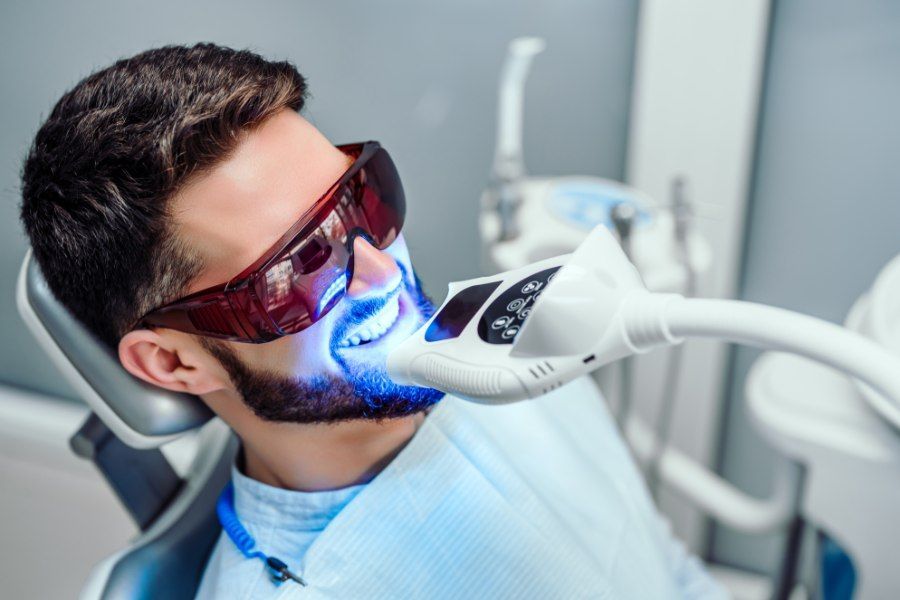Teeth Whitening

Teeth whitening is a cosmetic dental procedure to lighten the color of your teeth and remove surface stains or those that are deep-set. Over time, your teeth can become discolored due to aging, food and drink consumption, smoking, and certain medications. Whitening treatments work by breaking down stains and restoring the natural brilliance of your teeth.
At Hampden Ave Dental, we ensure that you achieve a brighter smile safely and comfortably. Our team evaluates your tooth enamel, tooth sensitivity, oral health, and whitening goals to recommend the most effective and gentle treatment option.
Services
Tooth Discoloration
Tooth discoloration occurs when your teeth become stained or darkened, either affecting the entire tooth or appearing as lines or spots on the surface. There are two main types of tooth discoloration.
Intrinsic Stains
Intrinsic stains develop within the tooth enamel, making them more difficult to remove than surface stains.
One common cause of intrinsic stains is antibiotic use—specifically tetracycline. If this medication is taken during childhood, especially while teeth are still developing, it can bind to calcium in the teeth and cause them to discolor from within.
Another cause of intrinsic staining is excessive fluoride intake during early childhood. While fluoride helps strengthen enamel, too much of it, excessive exposure during early childhood—such as regularly swallowing toothpaste or consuming water with high fluoride levels—can lead to dental fluorosis. This condition affects the way enamel forms and often results in white streaks, spots, or blotches on the surface of the teeth.
Aging also contributes to intrinsic discoloration. Over time, tooth enamel naturally becomes thinner, exposing more of the yellowish dentin layer beneath.
Additionally, certain health conditions can lead to internal tooth staining. Disorders such as liver disease, celiac disease, calcium deficiency, eating disorders, and other metabolic diseases can affect how teeth develop and mineralize, leading to discoloration from within the tooth structure itself.
Because intrinsic stains are located below the surface, they often require more advanced cosmetic treatments to achieve noticeable improvement.
Extrinsic Stains
Extrinsic stains develop on the outer surface of the teeth and are caused by long-term exposure to external substances that gradually discolor the enamel. Common substances that cause extrinsic stains include:
- Dark-colored beverages, such as coffee, tea, red wine
- Artificial food colorings
- Smoking or tobacco use
- Poor oral hygiene
Why Get Professional Teeth Whitening
While over-the-counter (OTC) whitening products like strips, gels, and toothpaste may seem like a convenient option, they often fall short in terms of effectiveness, safety, and long-term results. Professional teeth whitening provides lasting results with expert oversight.
Teeth whitening treatments primarily use peroxide-based bleaching agents, such as carbamide peroxide or hydrogen peroxide, to break down stains and lighten the enamel. While effective, these agents can cause tooth dehydration and sensitivity if overused or left on teeth too long.
Our team ensures your whitening experience is both safe and effective. We offer personalized recommendations and clear instructions tailored to your needs, whether you are whitening in-office or at home.
During our in-office treatments, we use a higher concentration of peroxide (typically 15% to 43%) under professional supervision. This allows us to safely achieve visible results in just one session. After the procedure, we provide our Essential Whitening take-home kit to maintain your results with safe, gradual touch-ups at your convenience.
Benefits of professional teeth whitening include:
- Effective and long-lasting results
- Safe for your enamel and gums
- Reduced sensitivity and enamel protection
- Even and predictable whitening
- Customized to your needs
Ideal Candidates for Teeth Whitening
Teeth whitening is a safe and effective option for people with healthy teeth and gums. However, it may not be suitable for:
- Patients with severe tooth sensitivity, since whitening agents can temporarily heighten discomfort.
- People with gum disease or untreated cavities, since bleaching solutions can aggravate these conditions.
- Teeth with crowns, veneers, or large fillings since these materials do not respond to whitening treatments.
Our providers will determine the right teeth-whitening approach for you after a detailed evaluation.
Our Teeth Whitening Process
Our providers examine your teeth and gums to ensure you are a good candidate for whitening. If you have cavities, gum disease, or sensitive teeth, we may recommend treating those first. We customize your whitening treatment based on the following factors:
- Your oral health
- Natural tooth shade and whitening goals
- Previous dental work
- Your timeline for results
What to Expect During Teeth Whitening
When you come in for a teeth whitening appointment, we will typically start by applying a gel to protect your gums, lips, and soft tissues. This ensures that only your teeth are exposed to the whitening agent, minimizing sensitivity and irritation to the gums.
Next, we carefully apply a high-concentration whitening gel (typically hydrogen peroxide or carbamide peroxide) to your teeth. This professional-strength formula penetrates the enamel to break up deep stains and discoloration.
Our providers may use a specialized light or laser to accelerate the whitening process. This helps enhance the gel’s effectiveness, lifting stains more efficiently.
We may repeat this process 2-3 times during the session for the best results. This approach allows the whitening agent to effectively break down stains and discoloration on the enamel.
Once your desired shade is reached, we thoroughly rinse off the whitening gel. We may apply a soothing fluoride treatment to help minimize any sensitivity.
For long-lasting results, we also offer our Essential Whitening take-home kit so you can maintain your bright smile between visits. We recommend touch-up treatments every 6 to 12 months to keep your teeth looking their best.
Get Professional Teeth Whitening in Lakewood, CO
Clear, stain-free teeth can boost your confidence and enhance your appearance. Over time, stains from coffee, tea, wine, and everyday habits can dull teeth, but our professional whitening service can safely and effectively restore their natural brilliance.
To schedule a consultation for teeth whitening, please call us at 303-985-1263 or request an appointment online.
Frequently Asked Questions
Can my badly yellowed teeth become white again?
Yes! Teeth can become yellow due to aging, diet, and oral hygiene habits, but professional teeth whitening can help restore their brightness. Achieving your desired shade may require multiple sessions, especially if the discoloration is deep or long-standing.
Your provider will walk you through the entire process, discussing what kind of results you can expect, how many treatments might be needed, and how to maintain your results long-term.
Can teeth whitening damage my teeth?
Teeth whitening is safe when done correctly, but overuse or harsh treatments can lead to issues. Whitening agents work by removing stains, but excessive or improper use can dehydrate the teeth and strip away essential minerals like calcium, leading to increased sensitivity and enamel damage.
This is why following instructions carefully is important, especially when using at-home whitening kits. When used as directed, dentist-approved kits can provide effective and safe results from the comfort of your home.
What are the side effects of teeth whitening?
While professional teeth whitening is generally safe, it can still come with temporary side effects, especially if done too frequently or using products with high concentrations of peroxide. The most common side effects include:
Gum irritation
Heightened tooth sensitivity
Softening or weakening of enamel
Roughening of the tooth’s surface
How can I keep my teeth white after whitening treatment?
To maintain your newly brightened smile, follow these tips:
Brush and floss regularly to remove plaque and surface stains.
Schedule routine dental cleanings to keep teeth polished and healthy.
Limit staining foods and drinks, such as coffee, tea, red wine, and dark berries.
Avoid acidic and tannin-rich foods, as they can weaken enamel and make teeth more prone to staining.

